|
Main Page
|
 |
|
Advisory /
BIOTECHNOLOGY |
Home
|
Why not GM Crops
By Ijaz Ahmad Rao _
Bahawalpur
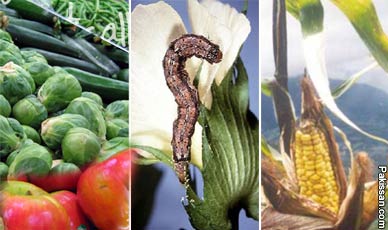 Biotechnology
has received far greater acceptance in the discipline of
medicine, energy and industrial sector as compared to the
field of food and agriculture; the main reason behind it is
a lack of awareness of common man. That is why modern
biotech industry is keep changing and redefining itself
during the last two decades. The use of genetic engineering
in agriculture is a complex issue that presents both
potential benefits and risks to human society and the
environment, with implications at the local and global
levels. Today a heated global debate has erupted over the
use of modern crop biotechnology; Government, journalists,
communities and farmers in developing countries are
deliberating about the same challenge as those in other
countries. Biotechnology
has received far greater acceptance in the discipline of
medicine, energy and industrial sector as compared to the
field of food and agriculture; the main reason behind it is
a lack of awareness of common man. That is why modern
biotech industry is keep changing and redefining itself
during the last two decades. The use of genetic engineering
in agriculture is a complex issue that presents both
potential benefits and risks to human society and the
environment, with implications at the local and global
levels. Today a heated global debate has erupted over the
use of modern crop biotechnology; Government, journalists,
communities and farmers in developing countries are
deliberating about the same challenge as those in other
countries.
Many are optimistic that plant biotechnology has come to
stay, and will be a major technology of the future -
potential benefits of it include improved crops that would
be more nutritious, higher yielding, need less pesticides,
resistant to weeds, and more environmentally sustainable
while anti campaigners believes that such a technology may
cause toxicity and allergenicity to human; that it can
create super weeds while number of sprays to control pests
on crops will increase extensively; In short crop
biotechnology is harmful to our health, environment and
economics rather safe and beneficial. This is the point
where most of the journalists and a common man get confused
and find hard to balance between the information coming from
two different schools of thoughts. Moreover the discussion
on the debate has largely influence by social, ethical,
religious, scientific, political, economic, legal and
cultural dimensions so it has become more complex for
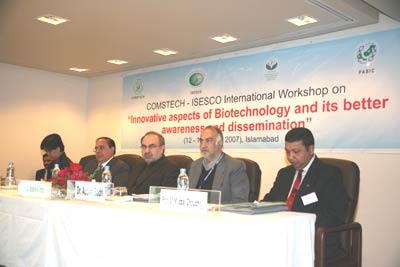 journalists
to position itself on the scale - as a result of it
scientists and journalists differed in their opinions about
the quality of media coverage of agriculture biotechnology
and biosafety, socioeconomic and ethical issues; however the
main sufferer in this war are the farmers, technology
developer and public who has been dragged on a bewilder and
puzzle road; but many stakeholders still recognize and place
great importance on the role of the media in shaping public
perception of Biotech science and technology. In March a
three days media workshop on “innovative aspects of
Biotechnology and its better awareness and dissemination”
was jointly organized by Comstech, ISESCO based in Tehran,
Pakistan Biotechnology Information Centre (PABIC) as well as
ISAAA. The main objective was to ensure that members of the
media, especially those who have opportunity to write about
agriculture biotechnology are well informed about
advancements in modern biotechnology. journalists
to position itself on the scale - as a result of it
scientists and journalists differed in their opinions about
the quality of media coverage of agriculture biotechnology
and biosafety, socioeconomic and ethical issues; however the
main sufferer in this war are the farmers, technology
developer and public who has been dragged on a bewilder and
puzzle road; but many stakeholders still recognize and place
great importance on the role of the media in shaping public
perception of Biotech science and technology. In March a
three days media workshop on “innovative aspects of
Biotechnology and its better awareness and dissemination”
was jointly organized by Comstech, ISESCO based in Tehran,
Pakistan Biotechnology Information Centre (PABIC) as well as
ISAAA. The main objective was to ensure that members of the
media, especially those who have opportunity to write about
agriculture biotechnology are well informed about
advancements in modern biotechnology.
During the inauguration session Dr Attaur Rehman, the
chairman of the higher education commission pointed out that
progress in biotechnology is vital to a country’s
development and urged media personnel to play their role in
raising awareness about biotechnology. Prof. Atta lauded the
efforts of Dr. Anwar Nasim, Chairman National Commission on
Biotechnology and added private enterprises are also taking
interest in this field and government welcomes their role in
socio-economic development of the country. Dr. Iqbal
Chaudhry, Dr. Mirachel Navaro, Dr. Abbas Sadri and other
eminent scientists were also present on the occasion.
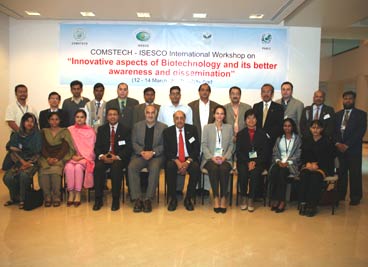 Pakistan
has several good institutions currently working on various
aspects of biotechnology. There are a number of
universities; which offer various degrees in this
discipline. However there is a serious lack of appreciation
of biotechnology at the public and industrial levels.
Coordination and exchange of information among institution
and practitioners of biotechnology is less then adequate.
Therefore there is a need of a resource center in Pakistan;
which can serve as a hub to disseminate information, to
support the collaborative efforts and to develop a network
of institutions and Individuals working in this field;
that’s why The Pakistan Biotechnology Information Center (www.pabic.com.pk)
has been established at Latif Ebrahim Jamal National Science
Information Center, University of Karachi under the
patronage of International Service for Acquisition of Agri-Biotech
Applications (ISAAA) and National Commission on
Biotechnology. The initiative of the establishment of
Pakistan Biotechnology Information Center is an attempt to
initiate multidisciplinary research and enhance the
awareness and appreciation of biotechnology at the local and
international levels. Pakistan
has several good institutions currently working on various
aspects of biotechnology. There are a number of
universities; which offer various degrees in this
discipline. However there is a serious lack of appreciation
of biotechnology at the public and industrial levels.
Coordination and exchange of information among institution
and practitioners of biotechnology is less then adequate.
Therefore there is a need of a resource center in Pakistan;
which can serve as a hub to disseminate information, to
support the collaborative efforts and to develop a network
of institutions and Individuals working in this field;
that’s why The Pakistan Biotechnology Information Center (www.pabic.com.pk)
has been established at Latif Ebrahim Jamal National Science
Information Center, University of Karachi under the
patronage of International Service for Acquisition of Agri-Biotech
Applications (ISAAA) and National Commission on
Biotechnology. The initiative of the establishment of
Pakistan Biotechnology Information Center is an attempt to
initiate multidisciplinary research and enhance the
awareness and appreciation of biotechnology at the local and
international levels.
Modern plant biotechnology, unlike traditional crop
technologies, changes the innate ability of crops through a
technique called genetic engineering to improve its
performance and endow it with new capabilities. Bacillus
thuringiensis (Bt) is a naturally occurring soil bacterium
that produces proteins active against certain insects
Modern biotechnology is exemplified by the much maligned
genetically engineered Bt genes in crops like cotton, maize,
soybean, canola etc; single or double gene transferred into
the plants innate ability of a soil microbe to fight the
destructive diseases and pests like bollworms, corn borer -
saves farmers the cost of buying and applying a chemical
pesticide and can increase nutrition and production.
According to our recent Economic Survey 2005-06 measuring
from a high base of last year, the performance of
agriculture has been weak - due to a relatively poor
performance of two of the four major crops, namely cotton,
sugarcane. One would like to list down some of the
predicaments our crops are faced with, which is really a
perturbing situation; Pakistan’s yield per acre ranks below
the average in the world, high price of agriculture inputs
like seeds, fertilizers, pesticides etc, higher intensity of
insects and pests attack, shortage of good quality and
varieties of seeds, insufficient availability of water for
irrigation. Additionally, the absence of a proper crop
insurance system or any support system in the shape of
subsidies by the government is resulting in frustration and
lack of motivation in growers to spend resource in their
fields in order to improve crop yields. At present, a major
part of arable land is cultivated by small farmers, with 86
percent of total number of farms comprising less than 12.5
acres. The number of small farms is continuously increasing
because of land division due to inheritance.
According to the study conducted by the Planning Commission
- Pakistan will have to increase its national average
agricultural yield to ensure food security for its growing
population, which has increased to 156 million in 2006 from
34 million in 1947.
 The
world average yield of wheat is around 1100 kg per acre,
while in Pakistan it is about 915 kg per acre; similarly
national average rice yield is 1165 kg per acre against
world’s average of 1585 kg per acre. In China and India, it
is around 2535 kg and 1180 kg per acre, respectively. It is
worth to remember that our potential for wheat yield ought
to be over 38 million tons at an average yield of 1.85 tons
per acre; we are annually losing about three billion US
dollar due to wheat production inefficiencies. While rice
production must rise to 6.5 million tons in 2010 from 4.2
million tons in 2006. The
world average yield of wheat is around 1100 kg per acre,
while in Pakistan it is about 915 kg per acre; similarly
national average rice yield is 1165 kg per acre against
world’s average of 1585 kg per acre. In China and India, it
is around 2535 kg and 1180 kg per acre, respectively. It is
worth to remember that our potential for wheat yield ought
to be over 38 million tons at an average yield of 1.85 tons
per acre; we are annually losing about three billion US
dollar due to wheat production inefficiencies. While rice
production must rise to 6.5 million tons in 2010 from 4.2
million tons in 2006.
Similarly the average yield of maize in Pakistan is around
715 kg per acre against world’s average of 730 kg per acres;
however maize average yield is 690 kg per acre in India and
2032 kg per acre in China. Similarly average cotton yield is
around 755 kg per acre in Pakistan against world’s 725 kg
per acre. Local demand from cotton and textile industry is
increasing each year in Pakistan; so cotton lint output has
been projected to increase to 21.5 million bales in 2015
from 12.4 million bales in 2006-07.
In fact before the arrival of modern crop biotechnology
technology; farmers around the globe had only option of
chemical pesticides as weapon to combat the major pests and
to mange weeds in the field, but with the passage of time
this methodology has became ineffective as many pests and
weeds showed resistance against most of pesticides available
in the market. With the introduction of GM crops, farmers
have been able to manage their cotton crops in a very
effective way because there is an in-built pest and weeds
control mechanism created in the plant to control pests and
weeds on time. Moreover it almost impossible and worthless
to spry during rainy and windy period even if farmers know
that their crops are under pests attack; however GM is the
only solution to protect crops in the such circumstances due
to its presence with in the plant life cycle.
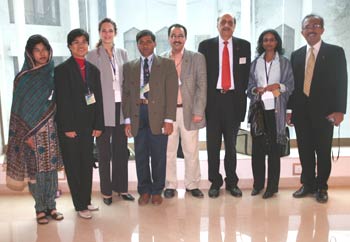 It
is worth knowing that in Pakistan, an estimated worth US$
300 million of pesticides are being used in agriculture, of
which more than 80 % is used on cotton especially to control
Bollworm known as “Sunides”; use of pesticide has reached
over 47,550 metric tons annually; due to indiscriminate use
of toxic chemicals health of people living in the rural
areas and environment have been affected badly on the same
time water quality of these region has been found
contaminated which is harmful for human and water echo
system. Although Bt cotton also provides significant control
of targeted bollworms but supplemental foliar insecticide
sprays are occasionally required to keep other bollworms and
sucking pests from causing excessive damage in Bt fields. It
is worth knowing that in Pakistan, an estimated worth US$
300 million of pesticides are being used in agriculture, of
which more than 80 % is used on cotton especially to control
Bollworm known as “Sunides”; use of pesticide has reached
over 47,550 metric tons annually; due to indiscriminate use
of toxic chemicals health of people living in the rural
areas and environment have been affected badly on the same
time water quality of these region has been found
contaminated which is harmful for human and water echo
system. Although Bt cotton also provides significant control
of targeted bollworms but supplemental foliar insecticide
sprays are occasionally required to keep other bollworms and
sucking pests from causing excessive damage in Bt fields.
A review of the first decade of commercially grown GM crops,
by UK-based consultants PGS Economics, has found large gains
from reduced use of pesticides. Farmers used almost 224
million kilograms less pesticide with GM crops between 1996
and 2005 - a significant reduction.
To date, there has not been a single claim paid by an
insurer for any injury, damage, expense, cost, loss or other
legal obligation resulting from any defect or harm caused by
use of an agricultural biotechnology product.
In 2006, 22 countries grew biotech crops, 11 developing
countries and 11 industrial countries; like USA, Argentina,
Brazil, Canada, India, China, Paraguay, South Africa,
Uruguay, Philippines, Australia, Romania, Mexico, Spain,
Colombia, France, Iran, Honduras, Czech Republic, Portugal,
Germany, and Slovakia. The global biotech crop area
continued to soar as the 250 millionth acre barrier was
breached, when for the first time more than 10 million
farmers in 22 countries. This unprecedented high adoption
rate is testimony to the trust and confidence of millions of
small and large farmers in crop biotechnology in both
industrial and developing countries. (ISAAA)
According to World Health Organization; “Vitamin A
deficiency affects 140 million children worldwide and causes
500,000 vitamin-A-deficient children to become blind every
year, half of them dying within 12 months of losing their
sight”. With its promise to combat vitamin A deficiency,
Golden Rice was quickly identified and adopted – is a
genetically modified rice which contains three genes that
produce high levels of beta carotene (Beta carotene is
contained in yellow fruits like carrots and mangoes and in
vegetables like spinach). Beta-carotene is converted in the
human body to the crucially needed vitamin A. Recently
Monsanto has granted patent licenses at no charge to the
developers of golden rice. Other crops, with other traits,
are in various phases of discovery, engineering, testing and
commercialization - Salt-resistant wheat, rice, sugarcane if
successful, this would open up a vast amount of land
currently unsuitable for its production. Similarly fruits
may not seem as important as foods like corn, soy, wheat and
rice in many countries but they are powerful economic
engines for large numbers of people around the world like in
Bangladesh after rice; papaya fruit crop has very important
role in their daily diet; papaya ring-spot virus (PRSV) was
threatening to devastate the Hawaiian papaya in 1990’s; a
PRSV-resistant cultivar was developed in GM papaya and now
successfully it has been grown there commercially since
1998.
 Pakistan
has large number of dedicated and highly qualified
biotechnologist, genetics, virologists and plant breeding at
well-known institutes like National Institute for
Biotechnology and Genetic Engineering (NIBGE) and Nuclear
Institute of Agriculture and Biology (NIAB) in Faisalabad,
and National Center of Excellence in Molecular Biology (NCEMB)
at Punjab University Lahore, Centre of Agriculture,
Biochemistry and Biotechnology (CABB), University of
Agriculture, Faisalabad and Central Cotton Research
Institute (CCRI), Multan which have capacity to develop new
crop breed and isolate and transform desire gene;
significant amount of financial resources have been
committed by the Government of Pakistan for developing
genetically modified local cotton varieties. Pakistan
has large number of dedicated and highly qualified
biotechnologist, genetics, virologists and plant breeding at
well-known institutes like National Institute for
Biotechnology and Genetic Engineering (NIBGE) and Nuclear
Institute of Agriculture and Biology (NIAB) in Faisalabad,
and National Center of Excellence in Molecular Biology (NCEMB)
at Punjab University Lahore, Centre of Agriculture,
Biochemistry and Biotechnology (CABB), University of
Agriculture, Faisalabad and Central Cotton Research
Institute (CCRI), Multan which have capacity to develop new
crop breed and isolate and transform desire gene;
significant amount of financial resources have been
committed by the Government of Pakistan for developing
genetically modified local cotton varieties.
So far public sector R&D centers, NIBGE and NCEMB have come
forward and submitted applications to the National Biosafety
Committee (NBC) - a directorate being established in the
Ministry of Environment to allow them for commercialization
and field trial of their versions of Bt Cotton. It is
noteworthy that NCEMB has developed four Bt pesticidal genes
used in cotton and rice against American bollworm and rice
leaf-folder; and confined field trials of Bt basmati 370
rice were successfully carried out at different sites near
Lahore.
According to unofficial estimates, in the year 2006-07, Bt
cotton varieties have been grown at a shocking percentage.
In Punjab, out of 5.60 millions acres of cotton crops, 0.23
million acres was reported as Bt cotton while in Sindh, out
of 2.3 million acres of cotton crops, 0.29 millions acres
were planted with transgenic cotton varieties; which means
that last season Bt cotton varieties were grown on half a
millions acres in Pakistan.
Moreover subject of Patents and intellectual property rights
have created strong debate in the developing countries and
even in United States and the European Union. That’s why
this new or modern biotechnology has captured the attention
of scientists, entrepreneurs, financiers, policymakers,
governors, and the public in general and the pressure is on
the journalists and media to illustrate factual data on this
subject. In Pakistan, we are already facing negative
consequence by not strengthening patents laws, due to which,
the markets are flooded with adulterated pesticides,
inferior seed quality, and poor quality of life saving drugs
etc.
During the workshop international Biotech experts Dr.
Claudia Canales, Dr. K M Nasiruddin, Dr. Mahaletchumy
Arujanan, Dr. Ismail Aly M Abdel Hamid, Dr. Bambang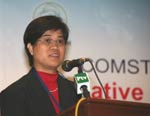 Purwantara and Dr. Sarwar Gilani pointed out how positive
and negative media coverage on a particular technology plays
a very crucial role in public acceptance and emphasized that
the issues related to biotech crops, e.g. the safety, the
need, challenges, potential, and concerns should be
discussed with journalists to enlighten them and to ensure
that proper and balanced reporting can be carried out.
Purwantara and Dr. Sarwar Gilani pointed out how positive
and negative media coverage on a particular technology plays
a very crucial role in public acceptance and emphasized that
the issues related to biotech crops, e.g. the safety, the
need, challenges, potential, and concerns should be
discussed with journalists to enlighten them and to ensure
that proper and balanced reporting can be carried out.
It is unfortunate many developing countries including
Pakistan missed the opportunities during the Green
Revolution; now farming methods of late 60’s are coming to
an end due to water shortage, soil degradation, loss of
seedling varieties and high input costs; while we are
entering into a new phase where with very limited resources
we have to deliver multiple benefits to different
stakeholders. There is no single solution is likely to solve
the our burgeoning problem in agriculture, food, energy,
health and environment however there is hope that at least
some of that solution will come by the adoption of modern
crop biotechnology; as GM crops have significantly increased
crops yields in many cases; are more environmental friendly
- fewer use of pesticides and cause less soil erosion; can
help small farmers to save more and combat poverty, because
GM food are safer than conventional due to its careful
evaluations at different levels by well-known institutes so
why not our farmers must have a choice either to take GM
crops side by side non GM?.
|
Pakissan.com;
|
|
|